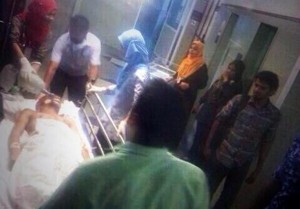Dr Akjemal Magtymova is currently acting UN Resident Coordinator and the World Health Organization’s Representative to the Republic of Maldives.
This year the United Nations in the Maldives is commemorating the 39th International Women’s Day. The theme for the day is “Equality for women is progress for all”. The Maldives has made remarkable achievements and addressed some critical issues in achieving gender equality.
Having endorsed a number of important international conventions and declarations, the country has made progressive efforts in positively translating these commitments into domestic legislations and policies.
The 2008 Constitution eliminated legal barriers that bar women from running for the highest public office as well as introduced affirmative measures to address inequalities for the first time. Furthermore, the Domestic Violence Act ratified in the year 2012 provided a much needed legal framework in protecting women from being subjected to forms of domestic violence and abuse.
Realizing gender equity is a road with milestones and there are difficult challenges ahead in achieving substantive results on gender equality and women empowerment. The Millennium Development Goal 3 (MDG3) can be seen as a compass in the road to “Gender Equality and Women’s Empowerment”: the Maldives has achieved one of the MDG3 targets of gapping gender disparity in primary and secondary enrollment while the remaining two targets on women’s political and economic participation are yet to be achieved.
Statistics from 2006 Census indicate 59 percent of women participate in the country’s labor force as opposed to 79 percent of men, despite the number of women enrolled in tertiary education being higher than that of men. In the Civil Service, only 25 percent of women earn more than MVR 15,000, although they represent more than half of the workforce meaning that the majority of women in civil service are working in lower ranks.
When it comes to their representation in key public positions, women are heavily under-represented in all three arms of the state. According to statistics from the Inter-Parliamentary Union (IPU), the Maldives remains at the 126th position in terms of female representation in the People’s Majlis, with just 5 female parliamentarians in the 77 member legislature. Furthermore, only 59 women have been elected to office in the 2014 local council elections compared to 1,025 men. There are only nine female judges and magistrates in judiciary with no female representation on the Supreme Court bench.
These data show that the Maldives need to make significant efforts towards gender balance to translate the equality guaranteed in the Constitution and laws into equality of results.
Social norms and stereotypes that expect women to undertake the bulk of domestic work are often a barrier to greater female participation in public life. In order to enjoy equal access to employment women should have access to services such as childcare facilities. Domestic violence is also one of the factors that prevent women from assuming greater roles in the society and public.
Mere complacency in addressing these issues could reverse the gains that have been already made so far. Focus needs to be drawn on measures that are required to accelerate the achievement of substantive gender equality in the society. Sufficient budgetary and human resources need to be allocated by the state to strengthen institutions to effectively mainstream gender into legislation and policies.
Every woman and girl, regardless of her economic status or where she lives, has equal rights to shape her own future and the future of the country. Human history has shown that women can be, and have been, at the forefront of positive societal advancements.
There are many able Maldivian women who are examples and inspiration for many more. These women, not only play an effective role in the local communities and the Government, but also contribute significantly beyond the national boundaries by actively engaging in regional, international and global forums and foreign diplomacy. This is a positive example providing inspiration for individuals and their communities to help unfold the potential of women to inspire change and development.
To borrow the words of the UN Secretary-General Mr Ban Ki-moon, “the importance of achieving equality for women and girls is not simply because it is a matter of fairness and fundamental human rights, but because progress in so many other areas depends on it.”
Wishing the Maldives further advancement in its development milestones and gender equity. The United Nations will remain a partner to support this progress through its collaborative programmes.
Happy Women’s Day!
All comment pieces are the sole view of the author and do not reflect the editorial policy of Minivan News. If you would like to write an opinion piece, please send proposals to [email protected]
